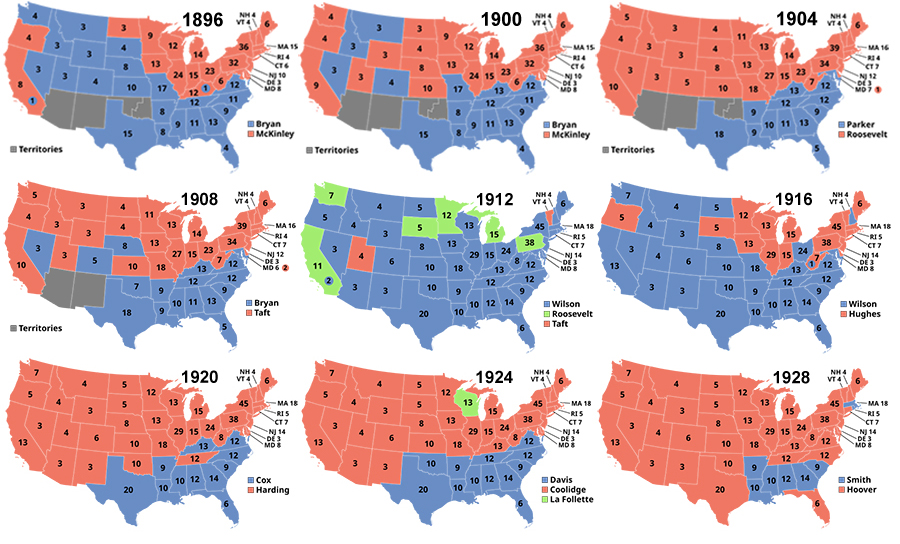

During his first term, Donald Trump's favorite president was Andrew Jackson, another populist who didn't pay much attention to the laws (or, famously, to the Supreme Court). Of course, Old Hickory defined what the Democratic Party was to become, but no one is perfect.
But Trump is fickle, and now his presidential love goes out to... William McKinley, not one of the all-time best-known and best-liked presidents (although he did get his own mountain). What's the deal with McKinley?
McKinley was a Republican, elected in 1896, reelected in 1900, and assassinated in 1901. McKinley did three things that Trump likes:
These did come with some downsides, though. The tariffs caused inflation and were wildly unpopular, causing the Republicans to lose 19 seats (out of 348) in McKinley's first midterm. The U.S. did acquire The Philippines as a territory during his administration, after a 3-year war that cost many American lives. But McKinley's longest lasting achievement was realigning the country to become dominated by the Republicans for the next 30 years. Look at these presidential election maps:

Before 1900, elections were kind of mixed, but from 1900 to 1928 Republicans dominated everywhere outside the solid South, except during 1912 and 1916, when a bad split between traditional Republicans and Teddy Roosevelt's reformers allowed Woodrow Wilson to get elected with a plurality of the vote (42% in 1912; 49% in 1916). Republicans also dominated Congress in this period. It is this decades-long Republican control of the country that Trump wants as his legacy, so he is naturally attracted to a Republican president who pulled it off (and got his own mountain as a consequence).
Trump is not the only Republican since McKinley with this dream. After the 9/11 attacks, George W. Bush was immensely popular. His political genius, known as "Bush's brain," Karl Rove, foresaw decades of Republican domination. However, a botched war in Iraq, a botched response to Hurricane Katrina, and a recession in 2008 paved the way for Barack Obama. Stuff happens. Will Trump be as successful as McKinley? Maybe, but there are multiple factors working against this.
First, McKinley tried (successfully) to unite a country still reeling from the Civil War. Does anyone see Trump as trying to unite the country still reeling from the Culture War?
Second, after McKinley's assassination, Teddy Roosevelt took over. He was a charismatic and wildly popular president who solidified the unification of the nation. He cracked down on the big trusts and endorsed the income and estate taxes, much to the dismay of Big Business. He created a big-tent party. Trump's goal is to have a party that can get 50.01% of the vote. We can't imagine a successor, say J.D. Vance or Gov. Ron DeSantis (R-FL), doing things that Big Business hates in order to please Democrats and bring them into the tent.
Third, the country is so polarized now that every presidential election comes down to at most a few hundred thousand votes in seven states. That is hardly a formula for an enduring majority. The country booted out the president's party in 2016, 2020, and 2024. Yet another flip in 2028 is certainly plausible if the Democrats can find the right candidate and especially if a split between a MAGA-man like Vance or DeSantis and a traditional Republican like Nikki Haley mirrors the Republicans' fracture of 1912.
Fourth, to a large extent, the Republican dominance now is due to what is basically a cult of personality around the person of Donald J. Trump. Republicans lost 42 seats in the House in 2018 because Trump wasn't on the ballot and his supporters didn't show up to vote. So far there is little evidence that Trump's supporters will automatically transfer to Vance, DeSantis, or any other Republican. Many of the marginal, low-information Trump voters who gave him victory in 2024 are Trumpians, not Republicans.
So while Trump may dream of Republican trifectas until deep into the 2050s, there is little reason to think that he can pull it off. Worse yet, if his administration is wildly unpopular for any reason (the economy, a war, or a surprise factor), that could lead to a Democratic trifecta as early as 2028. (V)